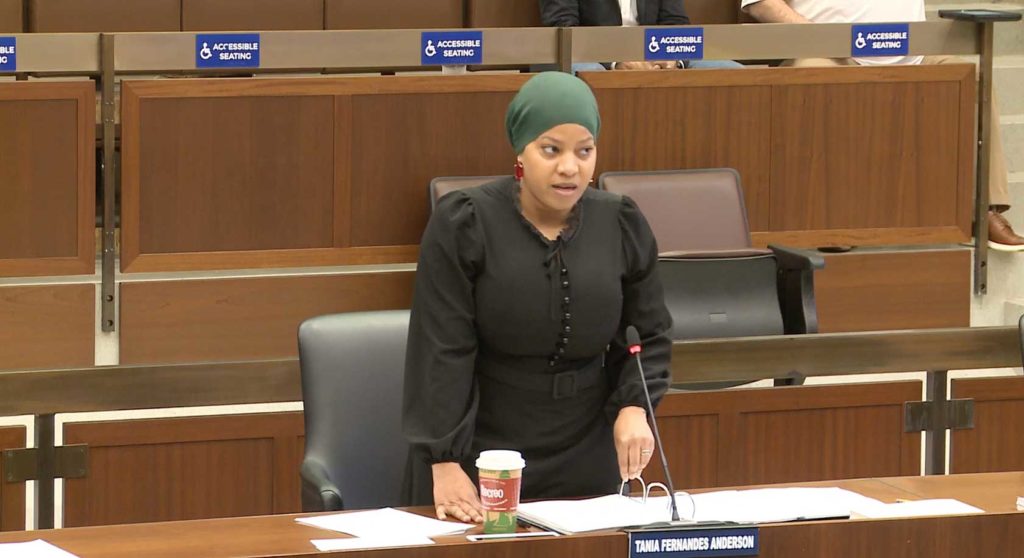Councilors push for Boston slavery apology
Measure, passed unanimously, calls on city to acknowledge, condemn and apologize for its role

The Boston City Council last week unanimously approved a measure to “acknowledge, condemn and apologize for the role played by the City of Boston in the trans-Atlantic slave trade and the ongoing detrimental impacts experienced by the Black people of Boston,” marking the latest step in the continued fight by councilors to win reparations for Bostonians impacted by slavery.
The resolution, put forward by District 7 Councilor Tania Fernandes Anderson, cites the city’s involvement in the trans-Atlantic slave trade. During the Colonial era, enslaved Africans were sold in Boston. Prominent Bostonians, including Peter Faneuil, who donated Faneuil Hall to the city, profited from the slave trade. Slavery was abolished in Massachusetts in 1783, after the colonies cut their ties with England. Boston was incorporated as a city in 1822.
Fernandes Anderson’s resolution sets out to achieve its goals through the removal of “prominent anti-Black symbols” across the city and by pledging to educate Bostonians on the history of the slave trade. Moreover, it promises to commit to creating a “registry of truth and reconciliation” for Bostonians wishing to apologize and express regret for past injustices.
While the resolution is nonbinding, it does stipulate that the council vows to “dedicate policies and efforts to repair past and present harm done to Black Americans via systemic racism in various realms of city life, including housing, healthcare, education, and the workplace.”
There is no funding to go along with the resolution, and it is unclear what direct actions it may spur. It does however, signal to councilors and reparations advocates that the city government is willing to acknowledge fault in the ongoing consequences faced by Black Bostonians.
“I’m asking you to give your heart and your courage … so that we can actually act upon our intention and, hopefully, acknowledge the harm and begin discussions about what it means to truly undo the harm that has been done to the African American people in the city of Boston,” Fernandes Anderson told her colleagues ahead of Wednesday’s vote.
Several councilors gave their vocal support in front of the small audience in the Iannella chamber, including District 3 Councilor Frank Baker, who despite reservations about the terminology of “apologizing,” lent his approval.
“There’s three pieces here —acknowledge, condemn and apologize … I feel so far removed from John Winthrop and Peter Fanueil and Harvard University. I grew up a little rough and tumble, we grew up poor. So, the apologize part is difficult for me,” Baker said. “But I think if my words can help your community heal, and our community in Boston heal, then I’m absolutely ready to do this and sign on to this and vote for this for you.”
At-large Councilor Ruthzee Louijeune also spoke in support of Wednesday’s resolution, saying “It’s not about whether it was your idea. It’s about acknowledging that profit, that wealth in this country [and] in the City of Boston … is rooted in an unjust system that really started with Indigenous folks in Mass Bay colony but continued with slavery.”
She continued, “So we have a lot of work to do to atone for that to repair the harm, and to do the work together, to really be honest about our history to do the work of repairing.”
This latest resolution comes months after at-large Councilor Julia Mejia proposed the creation of a commission to look into reparations for Black Bostonians facing repercussions of the city’s involvement with slavery, redlining and other forms of discrimination.
Councilors held a hearing in March to discuss how the commission might look and what the costs associated might be. A vote to officially create such a commission has yet to happen.
Mejia, who said she received backlash in the wake of her proposal, said she hopes that the acknowledgement of Boston’s role in slavery can lead to increased support for reparations.
“We have to keep showing up and pushing the envelope,” she said Wednesday.






